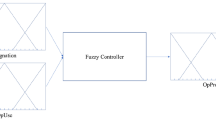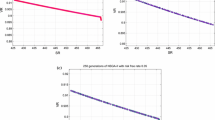Abstract
Aiming at the shortcomings of quantum-behaved particle swarm optimization algorithm (QPSO), an improved quantum-behaved particle swarm optimization algorithm (IQPSO) is put forward, and the improved algorithm is applied in solving a kind of fuzzy portfolio selection problems. Firstly, a kind of portfolio models with fuzzy return rates and background risk is established followed by some necessary preparations of fuzzy theory. Then, in the improved algorithm, hybrid probability distribution strategy and contraction–expansion coefficient with nonlinear structure are chosen to enhance particle’s exploration ability, and premature prevention mechanism is used to maintain population diversity. Furthermore, the experimental results on 16 benchmark functions show that IQPSO has better convergence and robustness than PSO with inertia weight, QPSO and QPSO with a hybrid probability distribution in most cases. Finally, when solving a fuzzy portfolio model, IQPSO provides comparable and superior results compared with the other metaheuristics.
Similar content being viewed by others
References
Baptista AM (2008) Optimal delegated portfolio management with background risk. J Bank Finance 32(6):977–985
Cai X, Teo KJ, Yang XQ et al (2004) Minimax portfolio optimization: empirical numerical study. J Oper Res Soc 55:65–72
Carlsson C, Fuller R (2001) On possibilistic mean value and variance of fuzzy numbers. Fuzzy Set Syst 122(2):315–326
Clerc M, Kennedy J (2002) The particle swarm-explosion, stability and convergence in a multidimensional complex space. IEEE Trans Evol Comput 6(1):58–73
Hamza F, Janssen J (1998) The mean-semivariances approach to realistic portfolio optimization subject to transaction costs. Appl Stoch Models Data Anal 14(4):275–283
He G, Huang NJ (2012) A modified particle swarm optimization algorithm with applications. Appl Math Comput 219(3):1053–1060
He G, Huang NJ (2014) A new particle swarm optimization algorithm with an application. Appl Math Comput 232(3):521–528
Kennedy J, Eberhart RC (1995) Particle swarm optimization. In: IEEE international conference on neural networks, pp 1942–1948
Li LL, Jiao LC, Zhao JQ et al (2017) Quantum-behaved discrete multi-objective particle swarm optimization for complex network clustering. Pattern Recogn 63:1–14
Li YY, Bai XY, Jiao LC et al (2017) Partitioned-cooperative quantum-behaved particle swarm optimization based on multilevel thresholding applied to medical image segmentation. Appl Soft Comput 56:345–356
Liu TY, Jiao LC, Ma WP et al (2016) Quantum-behaved particle swarm optimization with collaborative attractors for nonlinear numerical problems. Commun Nonlinear Sci Numer Simul 44:167–183
Luo HX, Jia PF, Qiao SQ et al (2017) Enhancing electronic nose performance based on a novel QPSO RBM technique. Sens Actuators B-Chem 259:241–249
Markowitz H (1952) Portfolio selection. J Finance 7(1):77–91
Meng XB, Gao XZ, Lu LH et al (2016) A new bio-inspired optimisation algorithm: bird swarm algorithm. J Exp Theor Artif Intell 28(4):1–15
Mirjalili S, Mirjalili SM, Lewis A (2014) Grey wolf optimizer. Adv Eng Softw 69(3):46–61
Mohadeseh S, Hossein N, Malihe M (2012) A quantum behaved gravitational search algorithm. Intell Inf Manag 4(6):390–395
Pan WT (2012) A new fruit fly optimization algorithm: taking the financial distress model as an example. Knowl Based Syst 26(2):69–74
Parsopoulos K, Vrahatis MN (2002) Particle swarm optimization method for constrained optimization problems. Eur Int Symp Comput Intell 76:214–220
Shi YH, Obaiahnahatti BG (1998) A modified particle swarm optimizer. IEEE Conf Evol Comput 6:69–73
Sun J, Feng B, Xu WB (2004) Particle swarm optimization with particles having quantum behavior. IEEE Cong Evol Comput 1:325–331
Sun J, Xu WB, Feng B (2004) A global search strategy of quantum-behaved particle swarm optimization. IEEE Cong Cybern Intell Syst 1:111–116
Sun J, Xu WB, Liu J (2005) Parameter selection quantum behaved particle swarm optimization. Int Conf Nat Comput 3612:543–552
Sun J, Xu WB, Fang W (2006) Quantum-behaved particle swarm optimization with a hybrid probability distribution. Lect Notes Artif Intell 4099:737–746
Sun J, Fang W, Wu XJ et al (2012) Quantum-behaved particle swarm optimization: analysis of individual particle behavior and parameter selection. Evol Comput 20(3):349–393
Tsanakas A (2008) Risk measurement in the presence of background risk. Insur Math Econ 42(2):520–528
Wang YJ, Shi XM (2019) Jumping dolphin swarm algorithm. Control Theory Appl 36(10):1755–1767
Yang XS, Deb S (2009) Cuckoo search via L\(\acute{e}\)vy flights. In: World congress nature biologically inspired computing, pp 210–214
Yang XS (2010) A new metaheuristic bat-inspired algorithm. Nat Inspired Coop Strat Optim 284:65–74
Yang ZL, Wu A (2020) A non-revisiting quantum-behaved particle swarm optimization based multilevel thresholding for image segmentation. Neural Comput Appl 32:12011–12031
Zhang F (2020) Intelligent task allocation method based on improved QPSO in multi-agent system. J Ambient Intel Hum Comput 11:655–662
Zhang WG, Wang YL, Chen ZP et al (2007) Possibilistic mean-variance models and efficient frontiers for portfolio selection problem. Inform Sci 177(13):2787–2801
Zhang WG, Xiao WL, Xu WJ (2010) A possibilistic portfolio adjusting model with new added assets. Econ Model 27(1):208–213
Funding
The work is funded by Chongqing Municipal Science and Technology Project (No.cstc2020jcyj-msxm3740, No.cstc2020jcyj-msxm3651), Chongqing Municipal Education Commission Project (No.KJ1500631), Doctoral Research Project of Chongqing Technology and Business University (No.2015-56-08) and Youth Project of Chongqing Technology and Business University (No.1552004).
Author information
Authors and Affiliations
Corresponding author
Ethics declarations
Conflict of interest
The authors declare that they have no conflict of interest to this work.
Ethical approval
This article does not contain any studies with human participants or animals performed by any of the authors.
Informed consent
Informed consent was obtained from all individual participants included in the study.
Additional information
Communicated by Vladik Kreinovich.
Publisher's Note
Springer Nature remains neutral with regard to jurisdictional claims in published maps and institutional affiliations.
Rights and permissions
About this article
Cite this article
He, G., Lu, Xl. An improved QPSO algorithm and its application in fuzzy portfolio model with constraints. Soft Comput 25, 7695–7706 (2021). https://doi.org/10.1007/s00500-021-05688-3
Accepted:
Published:
Issue Date:
DOI: https://doi.org/10.1007/s00500-021-05688-3




